Light and Sound -> nuclear reaction
Nuclear Reaction
A nuclear reaction is a process in which the nucleus of an atom is altered, resulting in the transformation of the atom into a different element or isotope. This process involves changes in the composition of the atomic nucleus and can release a large amount of energy.
Types of Nuclear Reactions
- Fission: In nuclear fission, the nucleus of an atom is split into two or more smaller nuclei, along with the release of energy and neutrons. This process is used in nuclear power plants and atomic bombs.
- Fusion: Nuclear fusion involves the combining of two light nuclei to form a heavier nucleus, releasing a large amount of energy. Fusion is the process that powers the sun and other stars.
- Radioactive Decay: This process involves the spontaneous disintegration of an unstable atomic nucleus, emitting radiation in the form of alpha particles, beta particles, or gamma rays.
Applications of Nuclear Reactions
Nuclear reactions have several important applications, including:
- Nuclear Power Generation: Fission reactions are used to generate electricity in nuclear power plants.
- Medical Imaging and Treatment: Radioactive isotopes are used in medical diagnostics and cancer treatment.
- Nuclear Weapons: Fission and fusion reactions are central to the functioning of atomic and hydrogen bombs.
- Space Exploration: Nuclear reactions can provide the necessary energy for long-duration space missions.
Study Guide
To understand nuclear reactions better, it's important to study the following concepts:
- What is the difference between nuclear fission and nuclear fusion?
- How are nuclear reactions used in nuclear power generation?
- What are the different types of radioactive decay, and how are they used in medical applications?
- What safety measures are in place to prevent the misuse of nuclear reactions in the development of nuclear weapons?
- Research the potential future applications of nuclear reactions in space exploration and energy production.
By understanding these concepts, you can gain a comprehensive understanding of nuclear reactions and their impact on various aspects of our lives.
[Nuclear Reaction] Related Worksheets and Study Guides:
.◂Science Worksheets and Study Guides Fourth Grade. Light and Sound
Study Guide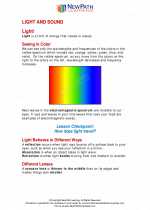 Light and sound
Light and sound  Worksheet/Answer key
Worksheet/Answer key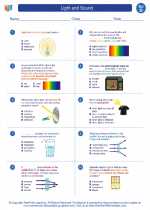 Light and sound
Light and sound  Worksheet/Answer key
Worksheet/Answer key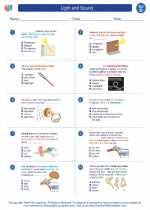 Light and sound
Light and sound  Worksheet/Answer key
Worksheet/Answer key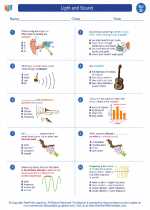 Light and sound
Light and sound  Vocabulary/Answer key
Vocabulary/Answer key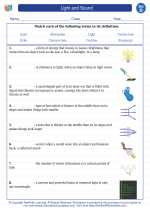 Light and sound
Light and sound  Vocabulary/Answer key
Vocabulary/Answer key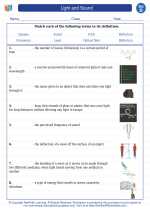 Light and sound
Light and sound  Vocabulary/Answer key
Vocabulary/Answer key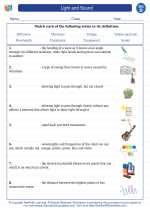 Light and sound
Light and sound 

 Worksheet/Answer key
Worksheet/Answer key
 Worksheet/Answer key
Worksheet/Answer key
 Worksheet/Answer key
Worksheet/Answer key
 Vocabulary/Answer key
Vocabulary/Answer key
 Vocabulary/Answer key
Vocabulary/Answer key
 Vocabulary/Answer key
Vocabulary/Answer key

The resources above cover the following skills:
PHYSICAL SCIENCE (NGSS)
Waves and their Applications in Technologies for Information Transfer
Students who demonstrate understanding can:
Develop a model of waves to describe patterns in terms of amplitude and wavelength and that waves can cause objects to move.